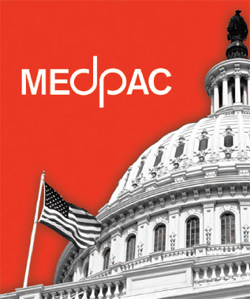MedPAC Offers DSH, 340B Recommendations
The Medicare Payment Advisory Commission has recommended that Congress direct changes in the 340B prescription drug discount program and in the manner in which Medicare makes disproportionate share hospital payments (Medicare DSH).
In its annual report to Congress, MedPAC recommended a reduction in 340B prescription drug payments to hospitals. The proposed reduction would cut 340B program spending approximately $300 million.
 MedPAC then recommended that those 340B savings be redirected to the Medicare DSH uncompensated care pool.
MedPAC then recommended that those 340B savings be redirected to the Medicare DSH uncompensated care pool.
And it also called for distributing the money in that pool based on better data on the uncompensated care hospitals provide, as reported on hospitals’ Medicare cost report S-10 worksheets, so that the Medicare DSH uncompensated care program would “…better target additional payments to hospitals that provide above average shares of uncompensated care.”
Most Pennsylvania safety-net hospitals participate in both the 340B and Medicaid DSH programs.
To learn more about these and other MedPAC recommendations, see the news release that accompanied the MedPAC report to Congress; a fact sheet on that report; and the report itself.








